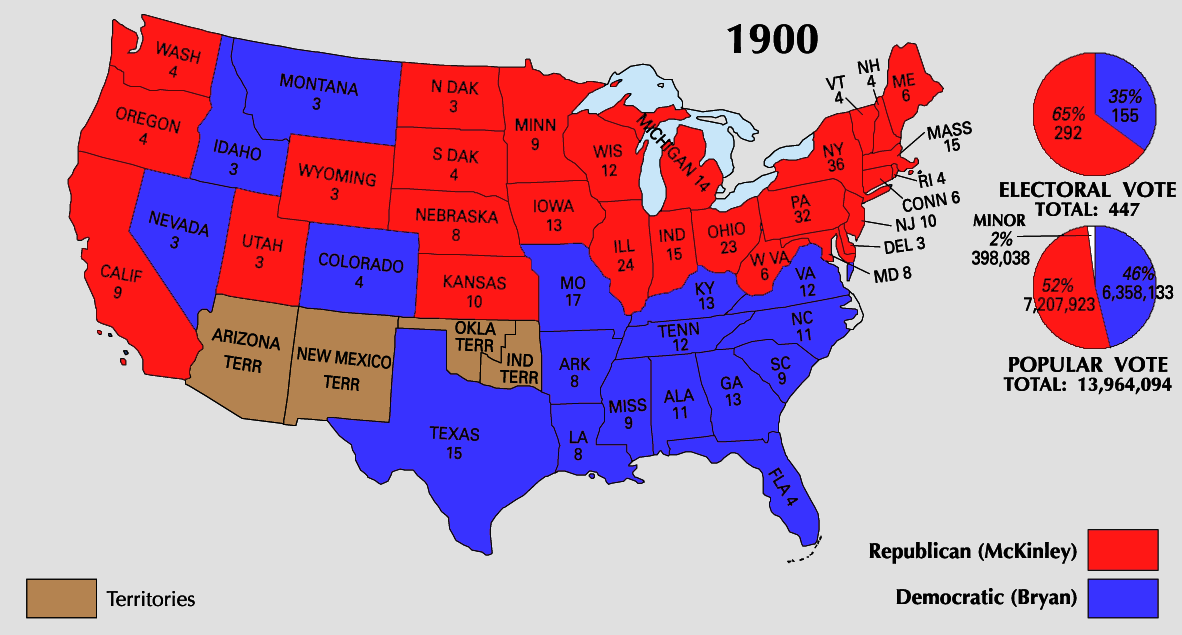The Presidential Election of 1900 would be a rematch of the Presidential Election of 1896 against William McKinley and William Jennings Bryan.

William McKinley was riding on a wave of popularity due to the decisive victory over the Spanish in the Spanish-American War. United States nationalism was on the rise, and the economy had recovered and was booming.
William Jennings Bryan easily won the nomination and still remained charismatic. However, he would face an uphill battle in this election due to McKinley's popularity and his war chest.
- Republicans: William McKinley and Vice President Theodore Roosevelt
- Democrats: William Jennings Bryan and Vice President Adlai Stevenson I
Platforms
Republicans: The economy was booming in 1900, so the Republican slogan of "Four More Years of the Full Dinner Pail," combined with victory in the brief Spanish–American War in 1898, had a powerful electoral appeal. Teddy Roosevelt had become a national hero fighting in Cuba during the war, and as such, he was a popular spokesman for the Republican ticket. Roosevelt proved highly energetic and an equal match for William Jennings Bryan's famous barnstorming style of campaigning. Roosevelt's theme was that McKinley had brought America peace and prosperity and deserved re-election. In a whirlwind campaign, Roosevelt made 480 stops in 23 states.
Democrats: Bryan's campaign was built around a reprise of his major issue from the 1896 campaign: Free Silver. It was not as successful in 1900 because prosperity had replaced severe depression, and McKinley claimed credit. Advocates of enlarging the money supply to raise prices had to admit that a great deal of new gold was flowing into the world economy, and deflation (i.e. falling prices) was no longer a threat. Bryan's second major campaign theme attacked McKinley's imperialism; Bryan had supported the war but opposed the annexation of the Philippines. He said McKinley had simply replaced a cruel Spanish tyranny with a cruel American one. Bryan was especially harsh in his criticisms of the American military effort to suppress a bloody rebellion by Filipino guerillas.
Both candidates continued the same campaigning style as in 1896. Personal attacks were becoming more common, and businessmen continued to play a growing role in both campaigns.
The same three issues of Prohibition, Women's Suffrage, and Civil Rights continued to gain momentum, with Women's Suffrage coming to the forefront.
Outcome
Up until World War II, a President was difficult to beat during a time of war. Here are wartime presidents who won re-election or were popular during or after a recent war.
- James Madison won during the War of 1812
- James K. Polk did not run for a second term but was popular for his efforts in the Mexican-American War.
- Abraham Lincoln won re-election during the Civil War
- Woodrow Wilson won re-election during World War I
- Franklin D. Roosevelt won re-election during World War II
William McKinley would be no exception.
Theodore Roosevelt proved to be a significant upgrade as Vice President. His charisma and accomplishments preceded him and would seal McKinley's victory.
William Jennings Bryan, at another time in history, would have been an excellent candidate and perhaps won the presidency, but he was unable to gain much traction despite his charisma.
McKinley would win re-election with 292 to 155 electoral votes.
